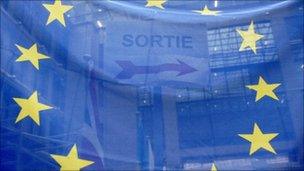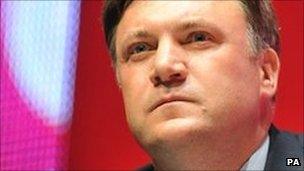Ed Stourton: Euroscepticism among Conservative MPs
- Published

Observers claim there are many more "withdrawalist" Conservative politicians than the party will admit
Two-thirds of Conservative MPs want to renegotiate the UK's relationship with Europe but are too scared to reveal their true Eurosceptic sentiment, claim Conservative Party insiders.
The latest intake of Tory MPs is far and away the most Eurosceptic in the Conservative Party's history.
Almost all of the pro-European "big beasts" of the Thatcher/Major years - men like Chris Patten and Michael Heseltine - are long gone from front-line politics.
According to Tim Montgomerie, the assiduous student of backbench opinion who writes for the website Conservative Home, external, a third of those now on the Conservative benches would like to see a fundamental renegotiation of the UK's relationship with Europe, and another third would like Britain to come out altogether.
The estimate of more than a hundred outright "withdrawalists" - Conservatives who essentially believe in the European policy of the UK Independence Party - suggests many Tory MPs are being coy about what they really believe.
'Supine approach'
Only ten Conservative MPs have declared their position publicly, by joining the "Better Off Out" group, which campaigns openly for withdrawal.
Today Euroscepticism is the iceberg of Tory politics; only the top is visible, but a large and - for the leadership - possibly dangerous mass lies beneath the water.
That impression is reinforced by the fact that two of the MPs I interviewed for BBC Radio 4's Analysis, external would talk only on condition we concealed their identity.
One of them told me that even though his views are, he believes, now "mainstream" in his party, he still sees support for EU withdrawal in Wildean terms as "the love that dare not speak its name".
The other complained of a "supine approach" to Europe by the Party's leadership since it came into government.
When the Conservatives were in opposition, David Cameron made a "cast-iron guarantee" that, should he be elected Prime Minister, he would hold a referendum on any EU Treaty that emerged, as "no treaty should be ratified without consulting the British people in a referendum".
The Lisbon treaty was ratified by all EU states , externalbefore the 2010 general election, but critics maintain that David Cameron reneged on his promise.

Ed Balls questioned EU movement of labour laws during the 2010 Labour leadership contest.
"The collateral damage from that broken promise", our un-nameable MP said, "is a bit of a black cloud over the government even now".
Could the government ship be heading towards a collision with the Eurosceptic iceberg?
There are signs of new currents of opinion on Europe swirling through the left of British politics too.
Last year, during the Labour leadership campaign, Ed Balls questioned one of the principles at the heart of the EU and its single market, the free movement of labour.
Mr Balls, now shadow chancellor, said he wanted to stop "the practice where people can work in our country and send benefits back to their own countries".
Blue Labour support
That theme has been picked up by Lord Glasman, the driving force behind the Blue Labour movement - which aims to revitalise the party's traditional grassroots support - and an influential adviser to the Labour leader Ed Miliband.

Blue Labour's Lord Glasman says EU rules depress workers' wages.
Maurice Glasman argues against the current EU rules which, he says, encourage people in poorer member states to leave their families to work overseas, arguing the practice can depress workers' incomes in richer economies.
He told Analysis he would be happy to make common cause with Tory Eurosceptics if he concluded it would advance his cause.
All these factors suggest that Europe could soon occupy centre stage in British politics once again.
And the crisis in the eurozone has offered a golden opportunity to those pushing the government to engage in debate about Europe.
Douglas Carswell, Tory backbench MP for Clacton in Essex, and one of the small group of Better Off Out MPs, argues that the eurozone crisis has destroyed the economic case for EU membership:
"Far from joining a prosperous trading bloc", he says, "we shackled ourselves to a corpse. We are now actually having to pay to prop up a zombie currency we didn't even join."
But Mr Carswell appears to be in a minority - not so much in his views, as in his enthusiasm for making Europe a salient issue at this stage of the current parliament.
Tory memories of the bitter divisions of the past over Europe are still raw.
Economy first
There is also a widespread recognition among Eurosceptic Tories that economic recovery, not Europe, must be the government's priority.
"So long as Britain is in an economic crisis", says Tim Montgomerie, "every Conservative MP knows that the focus must be on fixing that, and staying in coalition with the Liberal Democrats as a government of national unity."
Last month a group of more than a hundred Conservative MPs met in the Thatcher Room of the House of Commons to debate a European strategy.
The meeting's convener, the young MP for Camborne, Redruth and Hayle, and former Cameron aide George Eustice, said the group would be looking for "new thinking" on Europe, not campaigning for a referendum on British withdrawal.
One of those who attended the meeting, Clare Perry, a prominent member of the new intake of Tory MPs, described "this in-or-out discussion" as "a bit crude", and said she thinks the choice is between "the status quo or a renegotiation of the relationship".
The wildest card of all is what happens in Europe itself.
Almost everyone now agrees that fundamental reform of the Eurozone is inevitable - whether the Euro survives as a currency or breaks apart.
That in turn is bound to have an impact on Britain's relationship with the Eurozone countries, and may well force changes in the way the wider EU works.
Former Conservative Chancellor of the Exchequer Lord Lamont told Analysis that if the Eurozone countries form a tighter fiscal union, Britain might simply "wave goodbye" altogether.
And Mark Seddon, a Labour Party activist who runs the People's Pledge, external campaign for a referendum on EU membership, believes the sort of changes that are likely to come will force the government to put the matter to the public.
It is exhilaratingly uncharted territory, and the choices to be made will probably not become clear until much closer to the next election in 2015.
Those MPs who are so nervous about debating Europe now, may find that by the time they are ready to come out, the terms of the debate have changed beyond all recognition.
Analysis, external is on BBC Radio 4, external on Monday 17 October at 20:30 BST and Sunday 23 October at 21:30 BST. You can listen again via the Radio 4 website, external or by downloading the podcast, external.
- Published2 October 2011
- Published9 September 2011
- Published9 September 2011
- Published5 September 2011